#baron denon
Photo

Sketches of Voltaire aged 81, by Baron Dominique Vivant Denon, just 2 yrs before the great Enlightenment thinker would pass away, #onthisday in 1778. Learn about his relationship to Buddhism in Donald S. Lopez, Jr.'s essay "Voltaire and the Buddha" — https://publicdomainreview.org/essay/voltaire-and-the-buddha
34 notes
·
View notes
Note
Hi there,
I noticed you've been following me for awhile thanks. I saw some of your posts on the Howards and noticed that you mentioned somewhere that the Duke of Norfolk might have played a part in Cromwell's downfall in 1540 in order to get revenge for Anne Boleyn's execution.
That's a very interesting theory and I like it. Is there much evidence for any affection Norfolk or the other Howards had for Anne? I've always seen Norfolk as an evil villain who treated his family badly but maybe there was more to him than that?
Hello.
Sorry it's taken such a time to respond, but as you'll see it's VERY long, so I wouldn't start reading this on the bus.
Part One
As a child I used to be very annoyed by 20th-century writers treating historical figures like ice-cold robots welded to lifeless 'logic', and incapable of doing anything rash or ridiculous.
Oh why would Richard kill the Princes when it'd make him look bad?!
See? It must've been a plot by Margaret Beaufort all along.
(I know it's improved since then, but that first impression stuck.)
Reading history, I've always assumed family members instinctively cared for one another, unless their words and actions proved otherwise, and yet the above mentality pushed the exact opposite: that it was 'irresponsible' to even suggest any sort of natural bond between relatives unless they actually wrote it down, which is an absurd standard.
To me it's as silly as saying 'we don't know' if they breathed air as no one put it in a diary.
What does it matter how long ago they lived? They're still people.
I've even seen the extremely smug attitude that caring about one's own children is entirely a 'modern' invention, and the Mediæval and Tudor age wouldn't have understood such a concept.
Wouldn't have understood love!
Since then I've been interested in emotional bonds between friends and family, given how much closer they were than now, particularly rebelling against the idea Elizabeth didn't care about Anne.
And the Boleyns / Howards are my favourites, so their clannish level of kinship fascinates me the most.
Let's go through some of them:
Catherine Howard, Countess of Bridgewater
Catherine's first husband was Rhys ap Gruffydd, heir of a powerful Welsh family.
Problem was when his grandfather died Rhys got passed over (I expect because he was seventeen) in favour of Walter Devereux (the 10th Baron Ferrers), and Rhys wasn't 'avin that.
Devereux arrested him for disturbing the peace, which sent Catherine bananas as she'd convinced herself they were all out to get her husband.
In response she stirred up the local gentry and marched on Carmarthen Castle, threatening to burn the door down and bust on in there if Rhys wasn't freed.
Well after that unease and bitter factionalism bubbled up to denonation point, with servants killed on either side and Catherine attacking and destroying Devereux's property, meaning he sent word to England descibing BOTH of them as leaders of a 'rebellion and insurrection'.
Rhys sounds like a knob to me. You could say Henry caused this mess in the first place, but Rhys ought to have known where all this was leading.
His Wiki page lays it on that he was some noble folk hero martyred to the Reformation, but adding 'FitzUrien' to his name, thereby playing on ancient Welsh myths and thus (supposedly) announcing himself as Prince of Wales, was pushing his luck to say the least.
That's a worse blunder than Henry Howard made and no one ever feels sorry for him.
I shouldn't think he had conspired with James V, but going by this quote from the chronicler Elis Gruffudd (a very interesting fella in his own right) he wasn't universally mourned:
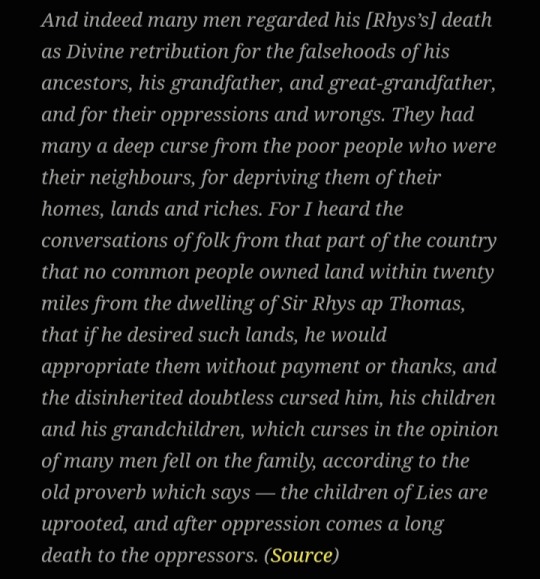
Rhys was beheaded in 1531, but Catherine was in the soup herself after all she'd been up to assisting him.
As Gareth Russell says:
'While we may never know exactly how much his own actions brought about Rhys's death, we can be certain of the devastating effect it had on his widow. She had been intimately involved in her husband's quarrel, and so the possibility that she would be accused of complicity in his alleged treason was tangible.
Left to forge prospects for their three young children — Anne, Thomas and Gruffydd — and fearful for herself, Lady Katherine followed in the footsteps of her elder brother Edmund and flung herself on the mercy of their niece, Anne Boleyn. Once again, the family's dark-eyed golden girl did not disappoint.'
It notable how often you see Anne, and later Elizabeth, willingly pull relatives out of sticky situations, which suggests at least some previous attachment on both sides, as I shouldn't imagine either would be too happy doing it for the more hostile characters.
Compare Katherine's reliance on Anne, a half-niece, to Elizabeth Seymour writing to Cromwell for help, not Jane, her own sister.
'She may even have tried to limit the damage for her aunt and young cousins shortly before Rhys's execution.'
Which was good of Anne considering Rhys had slagged her off, with both of those links having the nerve to imply his death was somehow her doing.
Had he lived, I do wonder if his opposition, compared to Catherine, who, familiarity or not, no doubt wanted to benefit from the connection, would've provoked a certain marital discord.
'Rhys had been attainted at the time of his conviction, meaning that the Crown could seize his goods and property, but his Act of Attainder specifically and unusally made provisions for his widow, who was left with an annual income of about £196.
If Anne could not save Rhys, she worked hard to salvage his family's situation.'
Meaning she got Henry to surrender some of his ill-gotten gains solely to avoid her aunt's destitution, where plenty of other widows and orphans were left to fend for themselves.
Anne also got Catherine a new husband in old-timer Henry Daubeney, but they bloody hated each other and split up soon enough.
According to Eric Ives:
'Over the winter of 1535-6, Katherine Howard, Anne's aunt, was trying to secure a separation from her second husband, Henry, Lord Daubeney. She told Cromwell that the only assistance she was receiving was from the Queen herself, and this despite the strenuous efforts which were being made to destroy her standing with Anne.
The help may have been very practical indeed; Lord Daubeney, who was certainly pleading financial hardship at one stage, reached an amicable agreement with his wife after Anne's father had made available £400.'
Even though this post about Catherine insists neither Anne nor Norfolk gave a toss about her personal woes, from the looks a things Anne was trying to solve this problem too.
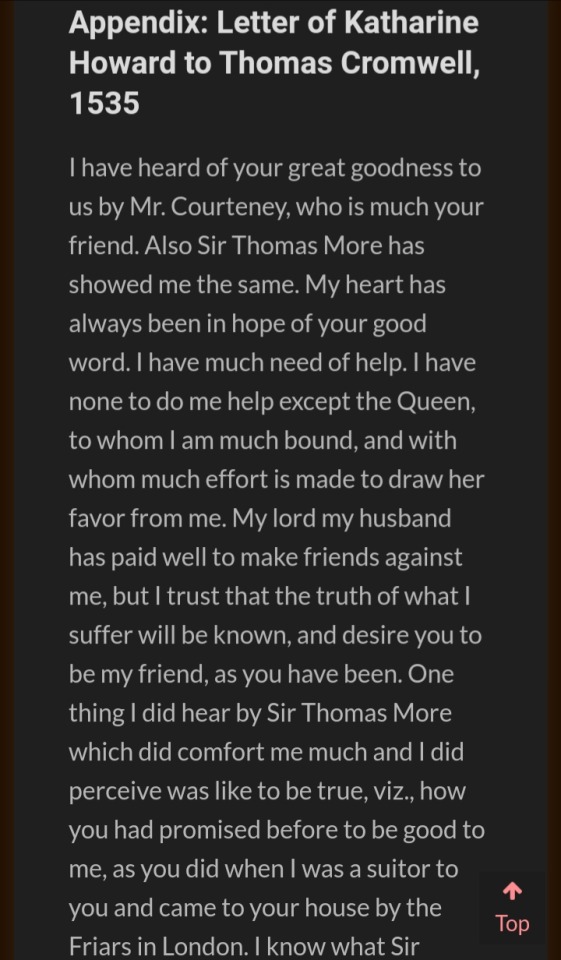
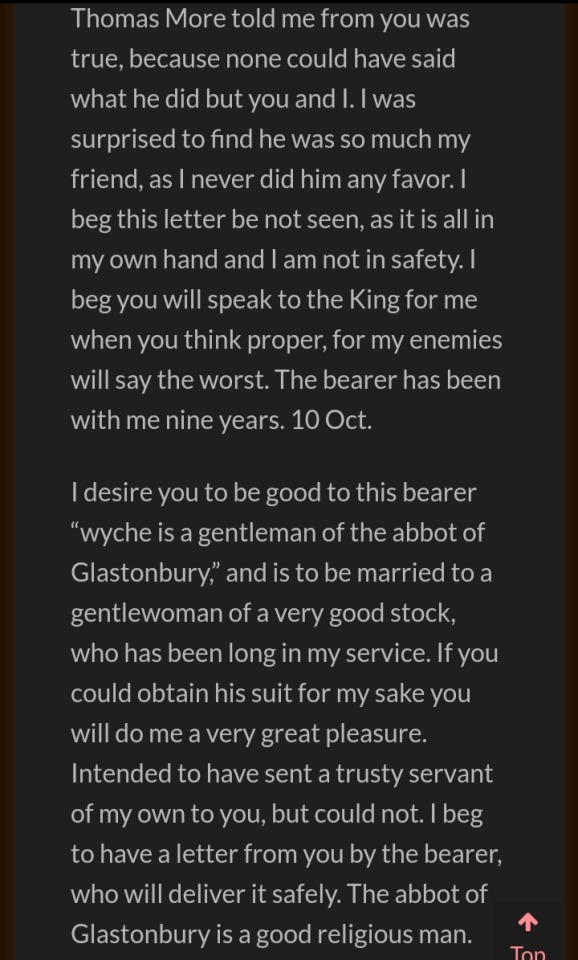
'I have none to do me help except the Queen, to whom I am much bound, and with whom much effort is made to draw her favour from me.
My lord my husband has paid well to make friends against me, but I trust that the truth of what I suffer will be known...'
One wonders how all these paid agitators ended up gathered 'round Anne, nagging or distracting her from Catherine's cause, but evidently she wasn't put off.
Plus, according to that last link, Catherine never learnt her lesson and took part in the Pilgrimage of Grace an' all, raising 3,000 men against Henry!
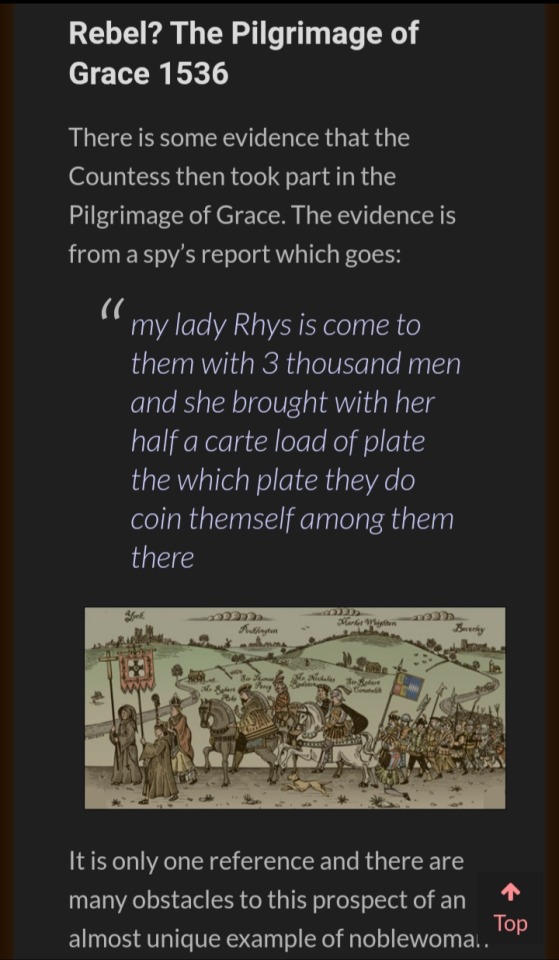
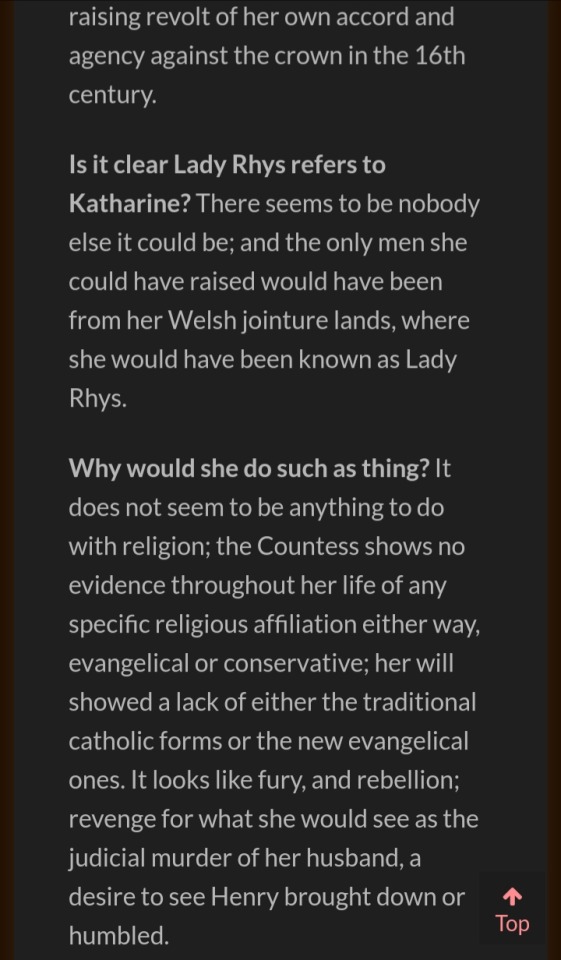
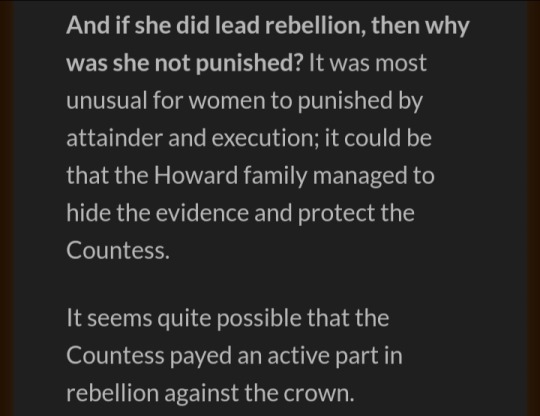
By the sounds of it, this isn't a sudden burst of furious piety at work, rather there's almost an absence of religion in Catherine's life.
The obvious explanation would be yet again wreaking vengeance in Rhys's memory, and that's evident given her long-standing vendetta against his disloyal servants.
But would it be too much to think she was motivated to a certain extent by the death of her niece and nephew, being 'much bound' to the former?
And as she avoided all punishment, the remaining Howards (i.e. Norfolk) had to have covered up for her.
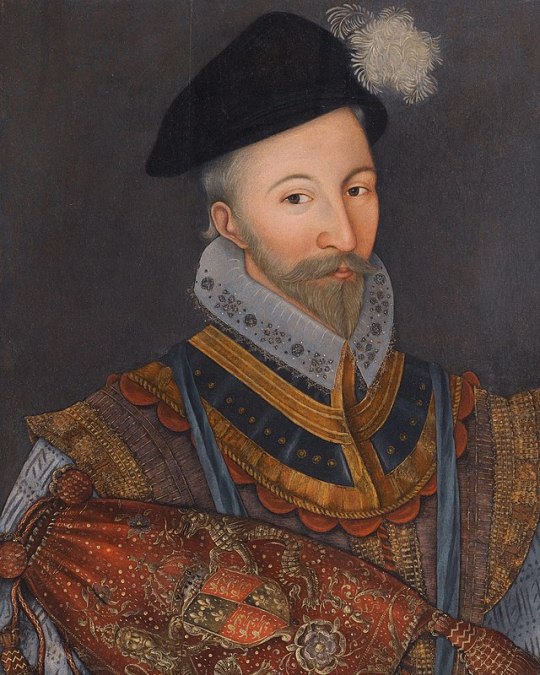
William Howard, 1st Baron Howard of Effingham
In 1529 there was much scrapping over the wardship of the Broughton sisters.
Wolsey ended up with the younger, Katherine, but upon his fall it seems Anne got the girl transferred to the care of Agnes Tilney, who then married her to William, so Anne was responsible for his first marriage.
(Not that it prevented Katherine Broughton from acting, as Ives puts it, as 'ringleader', in a demo for Mary six years later, and getting herself locked up in the Tower as a result, but there you go.)
Given the amount of important roles he enjoyed during Anne's queenship, all whilst barely out of his teens, she must have liked him:
• 1531: Ambassador to Scotland.
• 1532: Travelled to Calais with Anne to meet Francis.
• 1533: Served as Earl Marshal during Anne's coronation, in place of Norfolk.
• 1533: Held the canopy at Elizabeth's christening.
• 1535: Visited Scotland to award the Order of the Garter to James.
• 1536: Went again to Scotland to arrange a meeting between Henry and James.
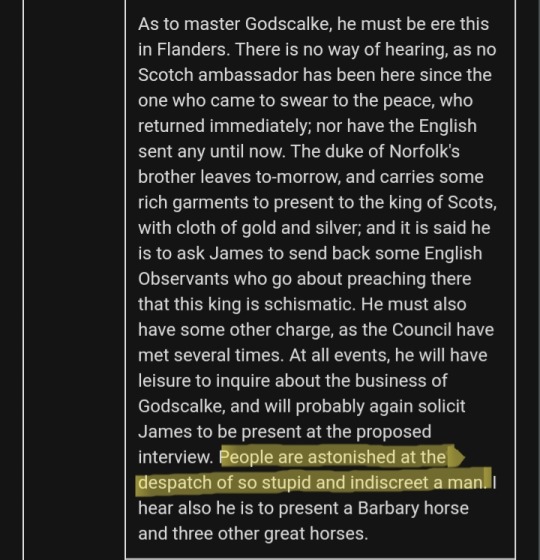
Besides, Chapuys said of him:
'People are astonished at the despatch of so stupid and indiscreet a man.'
So he had to be Anne's friend.
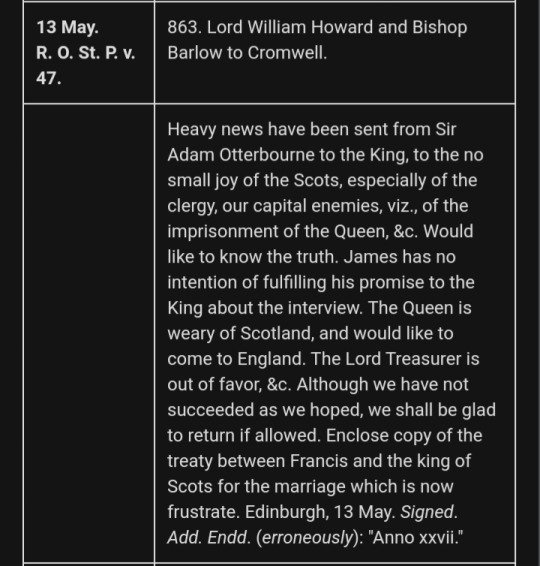
Once he hears of her arrest, William curses it as 'heavy news', demanding to know the truth from Cromwell and resenting all the Scottish clergy as 'capital enemies' for rejoicing in her fall.
Mainly I'm mentioning him to discuss his own character, and where his evident loyalty to other family might give us a further suggestion of his relationship to Anne, and how he kept to that sense of honour even when it led him into dangerous territory.
Consider, for example, how he named his son Charles after his brother, and called his daughter Douglas in honour Margaret Douglas, Charles's wife, thus commemorating their doomed romance.
You'd also be surprised how often he turns up in Young and Damned and Fair, as he appears to have been Katherine's closest uncle, for all that she's usually connected to Norfolk.
Indeed, so deep was he in it Agnes had to be advised not to warn him off coming home, meaning he arrived from France and found himself immediately clapped in the Tower, whereupon he craftily claimed all his best plate was washed overboard so Henry couldn't get at it, which worked.
Later, his connection with Henry Howard ensured he missed out on being Admiral, and when he did get it, Mary took it off him to punish his partiality to Elizabeth.
There's a section here detailing his bond with Elizabeth, where he's credited with saving her life, if you ignore the obvious errors:
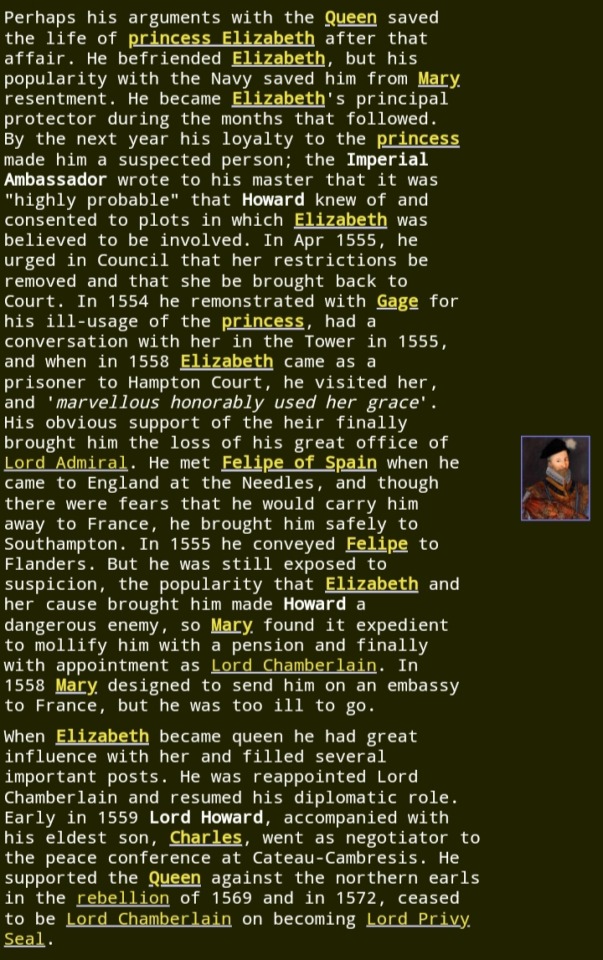
I especially like the idea everyone feared William would kidnap Philip!
However, there's a very odd paragraph in his son's Wiki page:
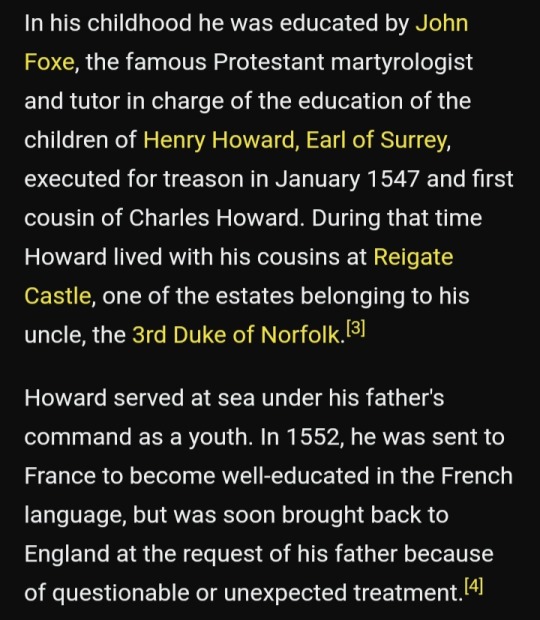
'In 1552, he was sent to France to become well-educated in the French language, but was soon brought back to England at the request of his father because of questionable or unexpected treatment.'
Am I mad or does this imply Charles Howard endured sexual abuse in his teens?
Were it only poor lodgings or sub-standard teaching, he could've moved elsewhere.
Were it excessive beating, you'd expect it to be made plain, not using all this cagey, obfuscating language.
But the thought did lead me to ponder their father-son bond, where Charles, whatever shame he suffered, knew he was loved enough that writing to his father would make it stop.
And William, reading it, rescued him immediately, proving the boy right.
This is a mere fancy of mine, but when it's just after Elizabeth's ordeal, whom he obviously cared so much about, and knowing she could easily have died like Katherine, which happened in part because he never stopped Dereham, one wonders if his moral failing then pushed him to protect Charles and Elizabeth later.
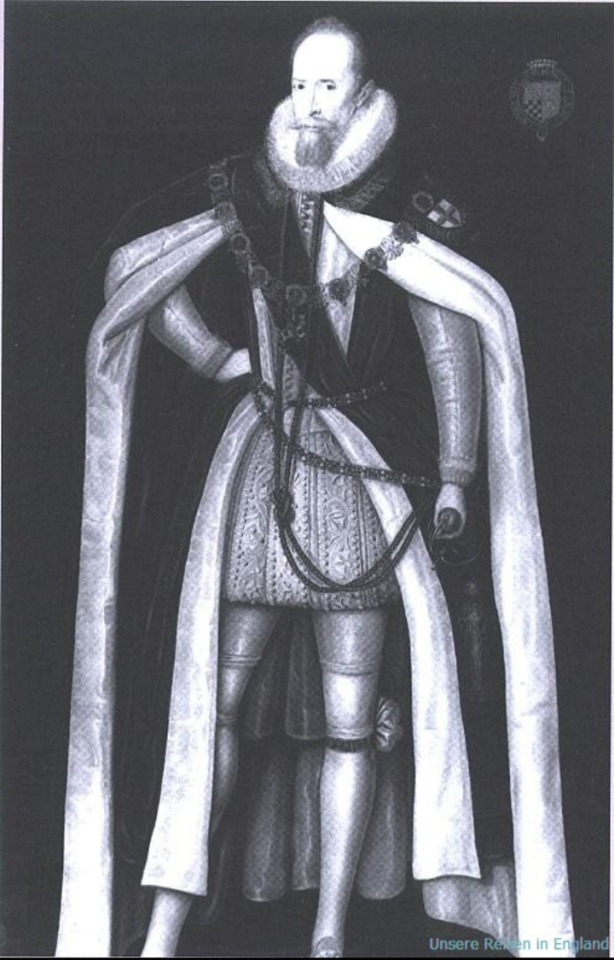
Thomas Howard, 1st Viscount Howard of Bindon
I'm hard-pressed to unearth much information on this lad, but everyone leaves him out so I won't.
There's gotta be some reason Elizabeth ennobled him, and so early on (in 1559) before he'd had the chance to serve her.
It can't just be she looked round the court, noticed he was the last of Norfolk's children, and awarded him for that.
I wish we knew more about Elizabeth's childhood, as in who she met and associated with at court, because you can be certain she met the Howards then.
I also want to add a little about his eldest son, the 2nd Viscount, who was...odd, to say the least:
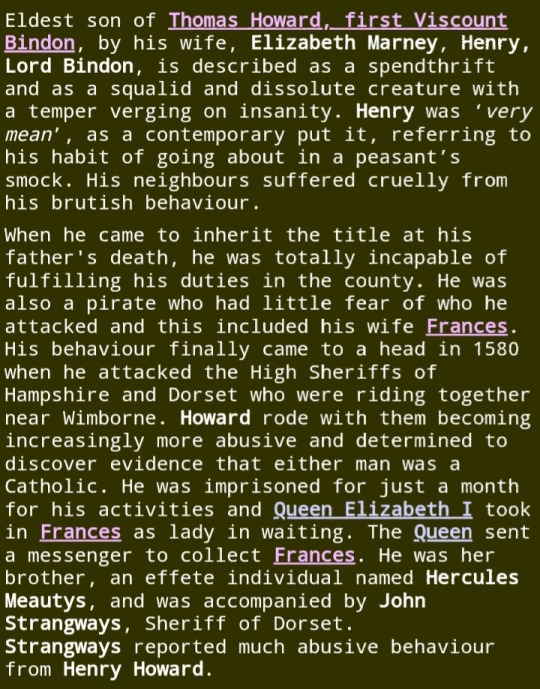
• Being a pirate;
• Dressing as a tramp;
• Beating everyone including his wife.
This gave me the the idea that perhaps his and Norfolk's reputation had somehow been rolled up together over the centuries, where this Henry Howard, although unknown today, was probably infamous in his time, and maybe his behaviour in a sense lended credibility to the accusations of spousal abuse against Norfolk, where people felt Henry 'got it from somewhere'.
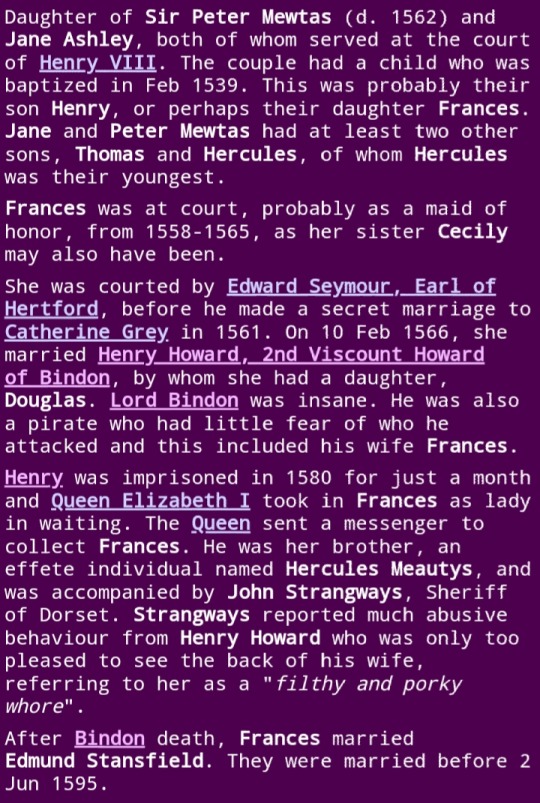
When Elizabeth learnt what he was up to, she sent Hercules Meautys (what a name) to rescue his sister, and took Frances in, with her husband dubbing her 'a filthy and porky whore', which was rich coming from him.
And his other son, the 3rd Viscount, killed his own father-in-law and had a long-running feud with Walter Raleigh.
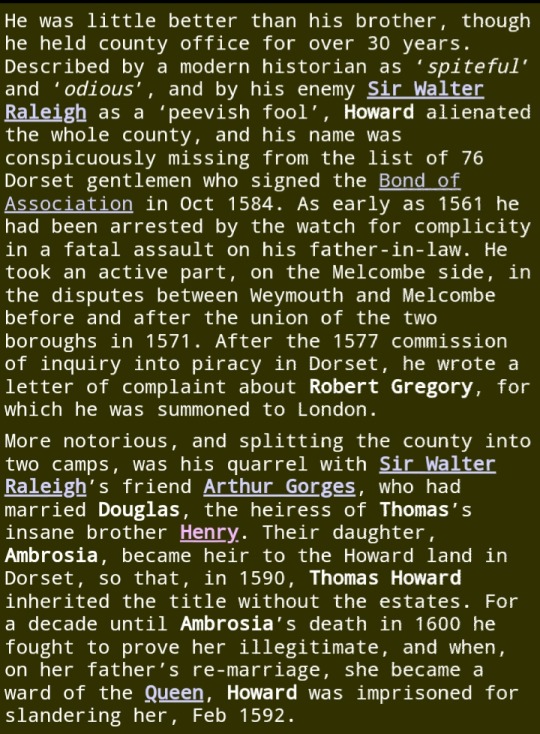
He also spent years trying to have his brother's granddaughter Ambrosia declared a bastard to grab all her land, so Elizabeth locked him up!
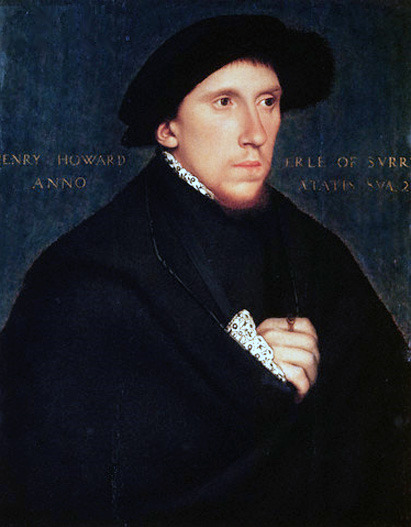
Henry Howard, Earl of Surrey
Anne found Surrey a wife and took him with her to France, where he and FitzRoy remained as honoured guests until the next autumn.
He was then obliged to serve as Earl Marshal as Anne and George were sentenced to death.
Four years later, according to Gareth Russell, Surrey not only watched Cromwell's execution, but gloated about it afterwards:
'Henry Howard, Earl of Surrey, stood at the forefront of the crowd and watched the scene without pity. He was missing his cousin's wedding to be here to see his family's bête noire finished off.
Later that day, he could not conceal his good mood. It felt to him like a settling of scores:
"Now is the false churl dead, so ambitious of others' blood."'
What does this mean?
Who's blood has Cromwell lusted after?
Who did he kill four years ago?
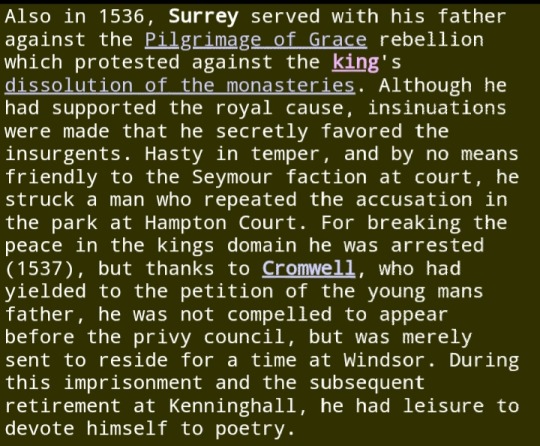
Surrey can't be referring to himself when Cromwell had actually protected him from punishment not long before, which in itself suggests a few interesting things:
• Cromwell was not yet aware of just how much the Howards despised him, as in, up til then his relationship with them was at least civil, cordial even, so the old line about Norfolk begrudging the 'new men' just because they're new men doesn't quite wash.
• This would've the perfect opportunity to bring down a mighty rival, but instead Cromwell felt bizarrely generous and intervened on Surrey's behalf, meaning he saw no harm in preserving the family, and instead thought it useful to get them on side.
• Why does he feel the need to favour the family?
Has he done something to antagonise them?
• The Howards are collectively putting on an Oscar-worthy acting routine of feigned friendliness, or at least indifference to said actions, so Cromwell, whilst he might suspect he's given slight offence, assumes it'll soon be forgotten if he pats them on the head here and there.
• Except whatever Cromwell did, saving Surrey wasn't enough to warrant forgiveness.
And let's examine this quote in detail:
Surrey is at 'the forefront' of spectators, keen to behold Cromwell dying in all its gory brutality, besides opting to watch such a horrendous deed over attending Katherine's wedding.
Instead of a happy celebration of his family's success, something he could've easily enjoyed in the knowledge of Cromwell being dealt with out of the way, he insisted on serving as a witness, as if it wouldn't be over until he'd seen it done, almost to be sure that it had.
For this would 'settle the score', shedding his blood in payback for... what exactly?
Thetford Priory?
Is that all?
Or for the blood Cromwell himself so coveted?
And even the sight of such suffering left Surrey unmoved, ridiculing the dead man not only as a 'churl', but a 'false' one.
False to whom?
'False' as in affecting loyalty to his Queen whilst working to bring her down?
Because is that extreme level of hatred really just supposed to be nothing deeper than empty class prejudice?
Usually, Cromwell's fractious history with the Howards is portrayed as Norfolk's one-man defamation campaign of all-encompassing lordly outrage verging on eye-popping insanity, except Surrey clearly loathed him too.
Perhaps from that we can conclude that Cromwell had become unpopular with the whole family, hence the 'bete noir' reference above.
When Surrey's resentment is remembered, it's conveniently boxed up and filed away as the same-old 'snobbery' of his father, which a very neat, uncomplicated excuse that prevents us looking into it properly.
I daresay Surrey was proud and class-conscious, but wouldn't everyone be like that, to a greater or lesser extent?
Why then is this 'haughtiness' only ever attributed to characters we're supposed to dislike, namely Anne, Norfolk, and occasionally George and Surrey, with the 'good' people somehow immune to such 'base' emotions?
Indeed, I'm starting to wonder how much real evidence there is for this common supposition of arrogance.
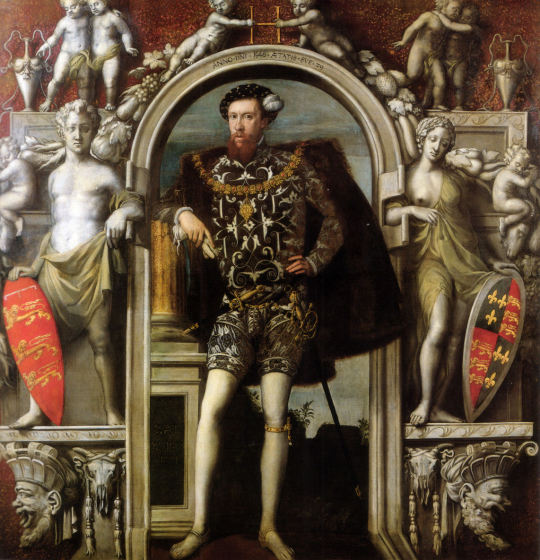
As if Surrey's known at all, it's for the manner of his death, namely he 'got himself killed' by 'stupidly' quartering the royal arms with his own, which, whilst a gross oversimplification, nevertheless defines him, where history views his character through this lens and reads his entire life backwards, as if there's no explanation for his behaviour other than he was just born to be a cocksure moron.
It plays upon modern bigotry against aristocrats, where they're all stuck-up, slow-witted inbreds fixated with the pecking order and archiac symbolism, keeping the honest worker down to prove they're better than everyone else, which is a laugh because they're all REALLY shallow, superfluous chuckleheads and deserve what they get.
Since the idea Surrey died for something so 'silly' as what badge went where slots so well into the stereotype, then it's cheapened his reputation overall.
Rather than being highly esteemed as a pioneer of English literature and the forerunner of Shakespeare, he's treated as nothing but a hot-headed toff tripped up by his own idiotic pretensions, with an end offered as a 'fitting' denouement, almost a lesson in morality; about where not 'knowing your place' or 'getting ideas above your station' leads... after vilifying Surrey and Norfolk for apparently demanding people know their place and not get ideas above their station.
Something hypocritical there.
There's also a reflexive judgementalism within this fandom and the lower end of publishing (i.e. novels and pop. history) where it's assumed if Anne or any of her family are executed, then even if they're technically innocent, they must've deserved it really, else 'the universe' wouldn't let it happen.
Therefore, known evidence is read with the most bad-faith interpretation, with any declared slip leapt upon and blown out of proportion, solely to prove their own bias correct.
You're right to think that, you are.
Hating them makes you A Good Person.
Again, this ONLY applies to Anne and her supporters, not her enemies.
No, no. They were martyrs to the Cause.
But I wouldn't say Surrey's usage of royal arms spoke to any pathological sense of superiority, certainly not to the extent it should define his memory.
Heraldry and ancestry is the lifeblood of nobility: everyone he knew fought for whatever their birth and court careers entitled them, so why shouldn't he?
Look at his sister protesting again and again and again for her rights as FitzRoy's widow: does this make her a 'snob' because she never gave up fighting?
In fact, dubbing Cromwell a 'churl' doesn't mean too much either.
The average person objects to someone because they're a thief, cheat, liar, etc. but calling them as much is a toothless insult, as they'd require a sense of honour to feel the sting.
And if they had that, they would've have committed the offence it in the first place.
So, you pick on something they probably are sensitive about, such as status or physical appearance, to get your own back.
Calling Henry VIII, for example, a fat bastard, doesn't mean you oppose him for having a weight problem, or that you dislike fat men generally.
It's that you're hitting 'below the belt' to inflict the worst punishment you can.
Oh yeah, it's petty, but the aggrieved often are.
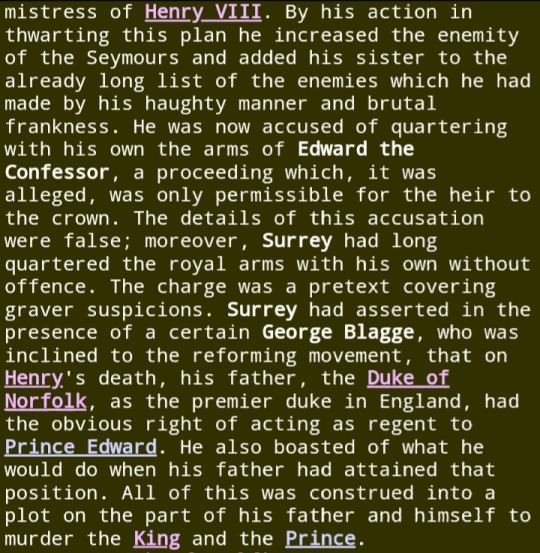
Surrey's real crime, if we deem it one, was apparently rash language of what vengeance he'd wreak on his foes once the King was gone, meaning the Seymours.
So is it mere coincidence that the main targets of this infamous 'snobbery' are those who caused or benefited from Anne's fall?
Are we to believe his only complaint, right down to twice vetoing Mary Howard's marriage, is nothing better than looking down his nose at humble Seymour origins, for they've done nothing whatsoever to draw his ire?
For all the time I've been reading history, the way the court of 1536 splits between the Boleyns and those pushing Jane Seymour, and then, once the Boleyns are wiped out, it greatest rivalry becomes Howard versus Seymour, one lasting for the remainder of Henry's reign, has always struck me as both telling and appropriate.
The idea the Howards took over hating the Seymours because of their slain family is to me to most obvious explanation; the driving force pushing the enmity beyond a decade, and blaming it all on snooty la-di-da attitudes baffles me.
It's so pat and offhand, as if it was thrown into historical research centuries ago and never questioned, passed down to us as unassailable received wisdom, rendered true from repetition, as no one likes Surrey or Norfolk enough to bother reassessing their motivations.
But could such prolonged open hostility run on no greater impulse than keeping the gentry in check?
Is THAT all?
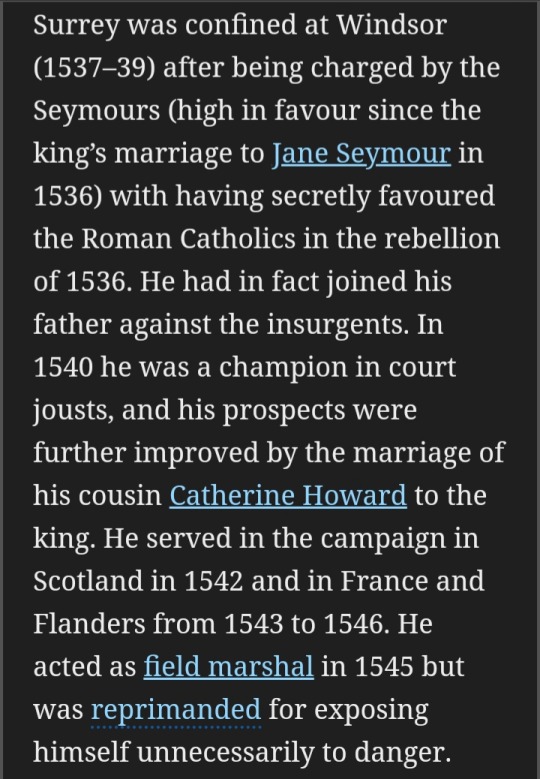
And do note how leading this narrative is, where, if we accept the Howards despised the Seymours as upstarts, then the fault for all bad blood is immediately shoved onto them and them alone, when those poor Seymour lads, rosy-cheeked and pure of heart, are just doing their best in life, working hard and loving everyone.
But oh! Those nasty Howards bullies are So Mean!
Not once is it reversed, proposing that the Seymours envied the Howards' breeding and birth, vowing to bring them down out of spite.
Instead they're absolved of all guilt in the conflict and justified in everything they do as a self-defence measure, even when they brought about Surrey's death and tried it on ten years previously.
So why on earth should he like them?
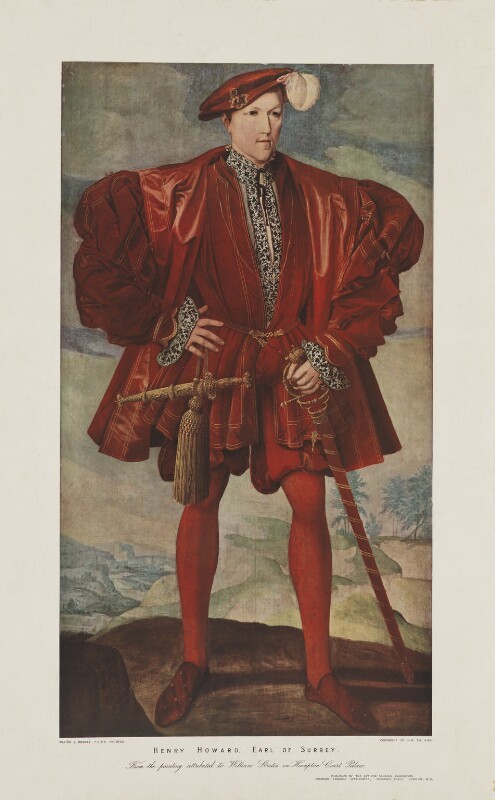
How I wish this painting still existed.
Starkey describes Henry Howard thus:
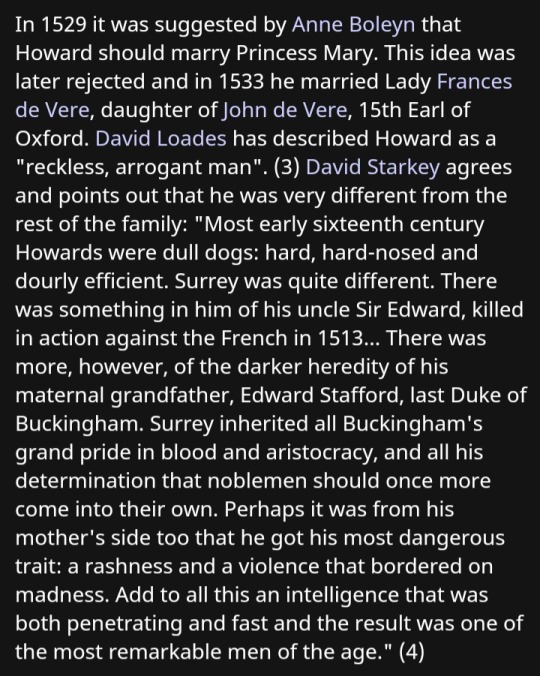
'Surrey inherited all Buckingham's grand pride in blood and aristocracy, and all his determination that noblemen should once more come into their own.
Perhaps it was from his mother's side too that he got his most dangerous trait: a rashness and a violence that bordered on madness.
Add to all this an intelligence that was both penetrating and fast and the result was one of the most remarkable men of the age.'
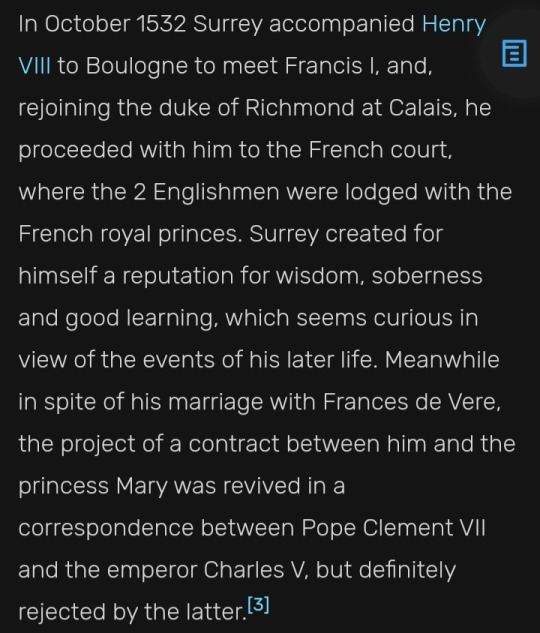
And yet I don't know of any aggressive outbursts prior to 1536, being then known for 'soberness and good learning'.
We tend to class poets of later eras as on the sensitive side, so far from being 'always like that', it may well be that the deaths of George, Anne, FitzRoy and putting down the Pilgrimage of Grace knocked him off the rails, a process then driven beyond all remedy by watching Katherine die and the suicidal shame he endured over his military failures.
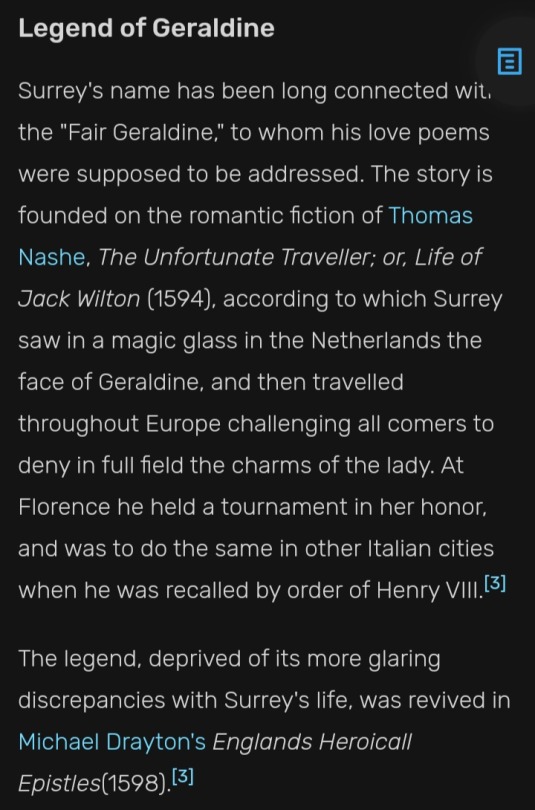
Although I do like the sound of him as the hero of High Fantasy.
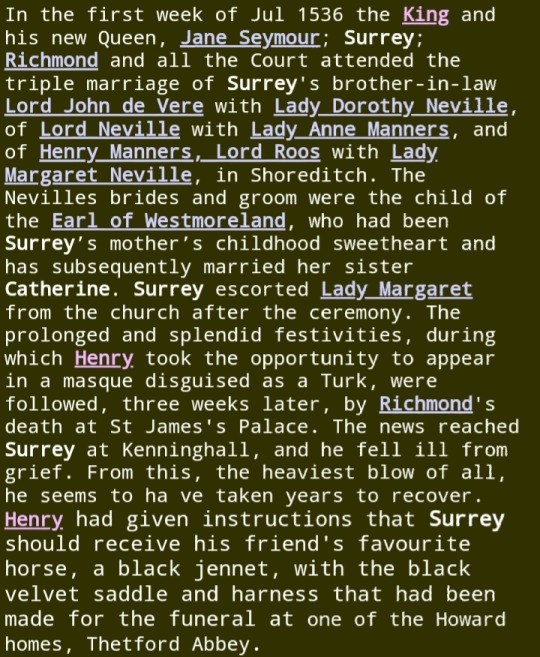
Whilst I'm here, let's look at this very awkward scenario of Surrey attending the triple Neville wedding, being the children of his mother's intended and her sister.
Considering how desperate so many are to clear Henry VIII of Anne's death, protesting how he Genuinely Believed and that makes it alright then, he's cheerful enough fannying about as a Turk less than two months later.
Finally, writing this I read several of Surrey's poems, and must include this truly endearing piece commemorating his wife's love for him:
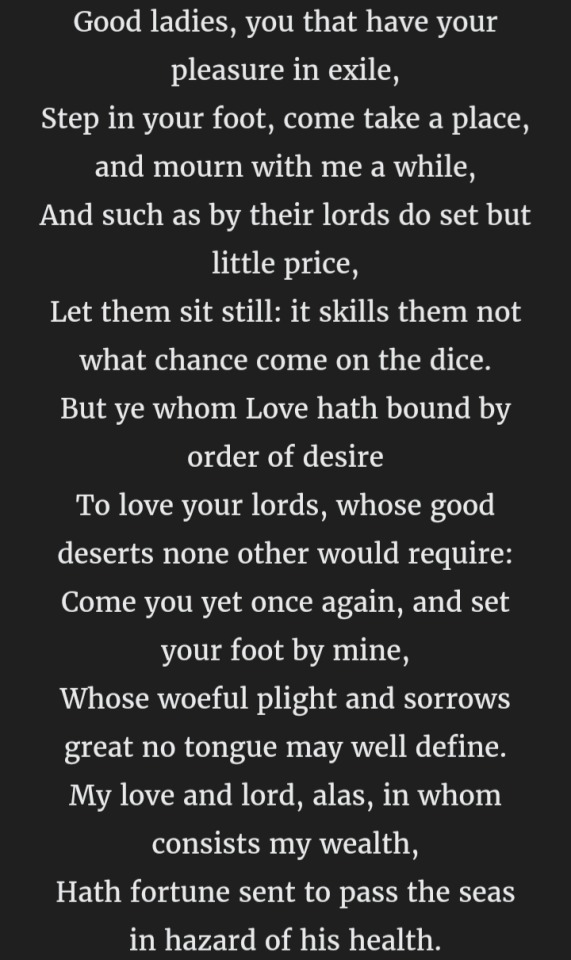
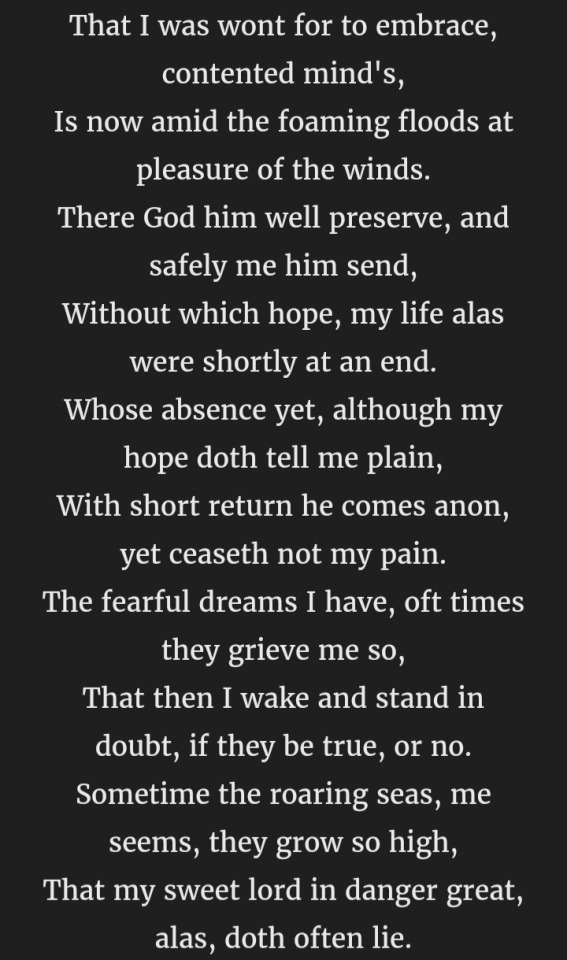
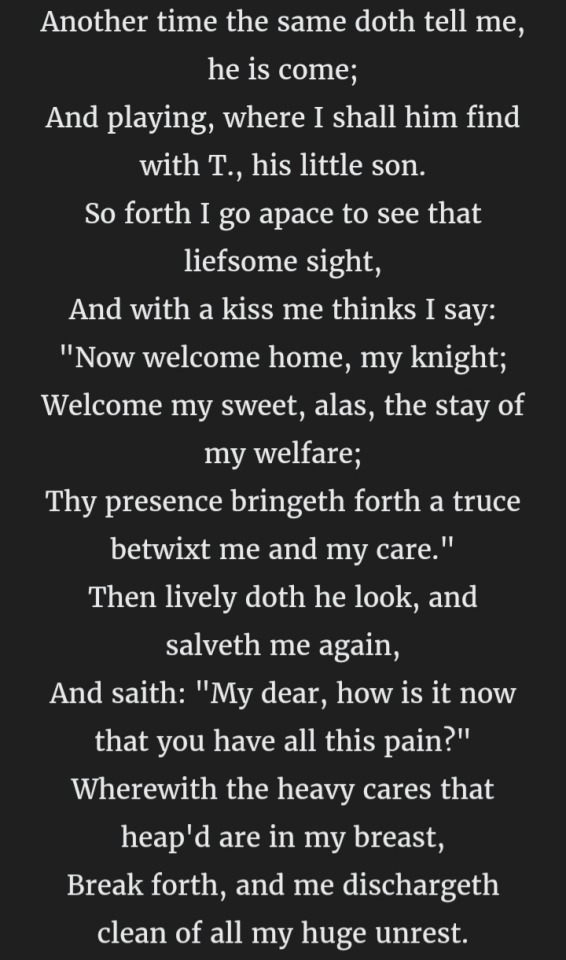
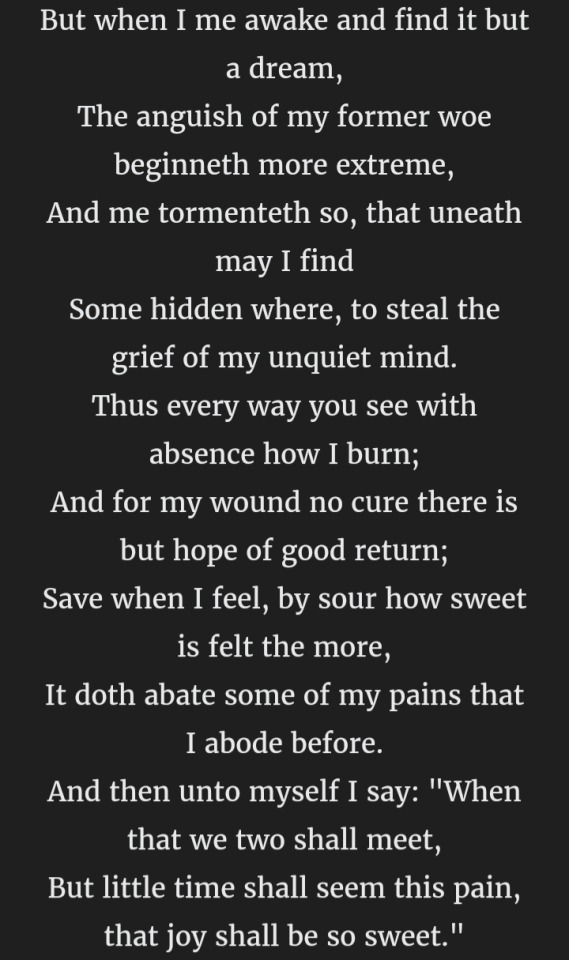
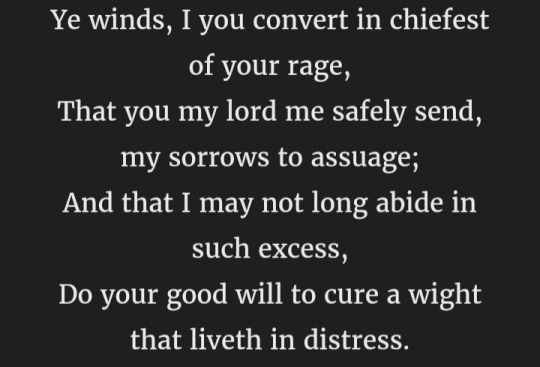
Such a poet, and still no one credits him with any tender emotions.
Anyway, don't mind me but I've hit the picture limit.
I'm not sure when Part Two will be done, but I'll let you know, come the time.
#Henry Howard#Catherine Howard Countess of Bridgewater#William Howard#Thomas Howard 1st Viscount Howard of Bindon#Anne Boleyn#Elizabeth I#Henry Howard 2nd Viscount Howard of Bindon#Thomas Howard 3rd Viscount Howard of Bindon#Frances Meautys#Rhys ap Gruffyd#Thomas Cromwell#Young and Damned and Fair#Gareth Russell#The Life and Death of Anne Boleyn#Eric Ives#David Starkey#Quotes
6 notes
·
View notes
Text

Succede ai baci come alle confidenze: uno tira l'altro, e via via si fanno più vicini e caldi.
Barone Vivant Denon
13 notes
·
View notes
Text

Baron de Denon
Père-Lachaise
1 note
·
View note
Quote
…certissimum est atque experientia comprobatum leves gustus in philosophia movere fortasse ad atheismum sed pleniores haustus ad religionem reducere.
Въ высшей степени достовѣрно и подтверждено опытомъ, что слегка пригубить философію, — можетъ быть, склоняетъ къ безбожію, но болѣе полные глотки возвращаютъ къ религіи.
Francisci baronis de Verulamio, vice-comitis Sancti Albani, De dignitate et augmentis scientiarum Liber primus.
The Works of Francis Bacon, Baron of Verulam, Viscount St. Albans, and Lord High Chancellor of England.
Collected and Edited by James Spedding… Leslie Ellis… and Douglas Denon… V. II. Boston:
Published by Brown and Taggard. M DCCC LXI.
P. 105.
1 note
·
View note
Text
Sunday 7th November 1824
8 40/60
3 50/60
Breakfast at 9 ¾ - From 10 40/60 to 1 ½ (in the meanwhile Mrs Barlow came to me for about ½ hour) wrote 3 pages the ends and under the seal to my aunt – then dressed and went down to luncheon with Mrs Barlow a little before 3 went there and back in a fiacre with Mrs and Miss Barlow, Mlle de Sans, M. Dacier and M. Eugene de Boyve to M. Le Baron Denon’s, quai Voltaire to see his collection of Egyptian antiques, paintings, Greek and Roman medals &c &c staid there near 1 ½ hour – several rooms thrown open to us – mummies and parts of mummies – several people there – Sundays are M.Le Baron’s public days when he has general beaucoup de monde [a lot of people] – He is a very gentlemanly pleasant old man – Knew Mrs Barlow well and was very civil to us – 2 of his nephews were there – or one nephew and another young man who explained things – the baron himself took much pains in shewing me in particular (I asked to see them) had Greek and Roman medals and the series of his own medals descriptive of the history of the life of Napoleon – Very well pleased altogether – In returning left Mrs and Miss Barlow to go home and got out to oblige Mlle de Sans and took a turn ½ round the Turilerie gardens – got home at 5 – Mrs Barlow came to me (she had left her rings in the morning) for 10 minutes – Dinner at 5 ¾ - a Swiss gent dined with us – in the evening sat next to Mrs Barlow and Miss Middleton and Mrs Heath who talked away and amused us exceedingly with anecdotes of her friend Miss Clementina Sterling Graham of Duntroon in Augusshire who made a great noise in Edinburgh last winter dressing herself up in various characters of old ladies and supporting her panto admirably she 5 or 6 and 30 – anecdotes, too, of the Thorntons of Edinburgh Ayrshire people the very family described by Lockhart in the ‘Ayrshire Legatees’ which I must read – it is very good –
Then poor Mrs Heath told us of the happy four months she had spent at Cheltenham, about a year ago where she reigned queen of beaux admiration. Where she had thirteen gentlemen always ready to ride out with her and was courted by everyone, she was quite the fashion. She had not been at all admired here and would up dress, it was not worth while no dress for the ladies, nor did she much mind their admiration. She had offers at Cheltenham and might have had many more, she flirted a little for amusement – I led her on to talk, she would tell anything about herself a little in the style Mrs Barlow talked at first but far beyond it – Miss Bellevue, Dacier, St. Auban, de Nappe and one or 2 more number [this] evening and one last a Swiss – an ecarte table – came upstairs at 10 50/60 with Mrs Barlow stopt a few minutes talking to her in her anteroom –
Kissed her in the little dark passage as we came out of the dining room, she lets me kiss her now very quietly and sits with her feet close to mine. She said something to me when I took her round the waist tonight, oh said I, don’t be angry you know you cannot come to me tonight said she, significantly you don’t think me angry – tis plain enough she likes me and I always feel excited when with her and even now in thinking of her. I asked what she thought of Mrs Heath’s conversation, ah said she thought it a little in my style, I owned this and said I had wished to notice the effect of it in others. She said she knew this at the time but Mrs Heath went far beyond her and she only talked of her beaux before she was married this was not the case with Mrs Heath – I agreed. She evidently likes to stand talking to me, if I had a penis tho’ of but small length I should surely break the ice some of these times before I go – we were much by ourselves at M Denon’s. I pointed out two phalli, said the beetle was an indecent emblem and pointed out an indecent print of a wake or fete where the people seemed to be dancing and the breeches of the men made to shew their erections – ½ eating grapes from 12 10/60 to 1 wrote all this journal of today – find day – although a little damp and some rain but 10 this morning – Fahrenheit 64 at I p.m. E.. O. -
Fun Fact: Here is a portrait of the Mistress of Disguise, Miss Clementina Stirling Graham of Duntrune.
Note: Anne may have been mistaken about the authorship of ‘Ayrshire Legatees’, which was written by Scotsman John Galt, a contemporary of Lockhart’s.
Also, it is worth noting that M. Denon passed away the following April after Anne had met him and enjoyed his antique collection.
(Diary reference: SHMLE80073)
#1824#november#paris#place vendome#anne lister#maria barlow#baron denon#clementina stirling graham#mummies#greek & roman#Ayrshire Legatees#john galt#john gibson lockhart#anne lister code breaker#gentleman jack
4 notes
·
View notes
Photo

Jim Hall Trio Featuring Tom Harrell.
– These Rooms. 1988 : Denon.
[ support the artist ★ buy me a coffee ]
#jazz#jazz guitar#electric guitar#jim hall#denon#tom harrell#joey baron#trumpet#jazz trumpet#1988#1980s#1980s jazz
10 notes
·
View notes
Photo


Dominique-Vivant Baron Denon, Fransız sanatçı, ressam, diplomat ve yazar.
Voyage dans la Basse et Haute Egypte : Planche 106.
Phallus phénomenal, 1894
0 notes
Photo


Anônimo, Les Bigarrures, 1799
This series of French illustrations was first published in 1799 with the overall title Les bigarrures (The Patterns of Colour). They are signed ‘William C.B.’, but the actual artist is unknown; they have been attributed to Dominique Vivant, Baron Denon, the French artist, writer, diplomat, author and archaeologist, but the style is much looser and more colourful than Denon’s known work. In many ways it is closer to that of the English caricaturist William Hogarth (source: https://honesterotica.com/)
52 notes
·
View notes
Text
Older Larrey and the company he keeps.
Orientalism is in fashion, people support the Greeks in their struggle for independence against the Turks, Gérard de Nerval is preparing his trip to the East, Victor Hugo has published Les Orientales. Alexandre Dumas also seeks documentation because his editor of the Bureau de l'Echo des Feuilletons is anxious to publish the periodicals that his subscribers demand. Who moreover, better than Larrey, could inform him about the regions of the eastern Mediterranean?
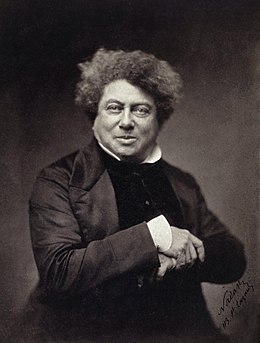
{Alexandre Dumas, photography by Nadar.}
At Dumas’, the Larreys meet Baron Taylor, an informed art lover. Commissioner of the Théâtre-Français, he accepted that Hernani be staged and returned from Spain where he bought on behalf of the Louvre the Velasquez or Murillo paintings that Soult had not been able to appropriate to resell to the English. In 1836, he took part in the erection of the Luxor Obelisk on the Place de la Concorde.

{Le Baron Taylor}
Of the caliber of Vivant Denon, he is a man whom H. Larrey admires to the point of saying about him:
"One still listens to him when he doesn't speak anymore!"
There is also Franz Liszt, with his emaciated face, his long, already silver hair while he is not thirty years old. Famous for the power of his compositions, the virtuosity of his technique, he is also passionate about philosophy and human physiology and has found in Larrey an excellent interlocutor whom he can question at will.
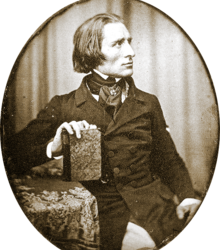
{Franz Liszt in 1843}
When he stays in Paris, the prince of Metternich, the man who fixed in 1815 at the Congress of Vienna the destiny of Europe for one hundred years, seeks the company of Larrey because he prides himself on his knowledge of anatomy, cerebral in particular. [..]
In the salon of the Duchess of Abrantès as in that of Dumas, Larrey found by chance René de Chateaubriand, who attends only that of the resplendent Juliette Récamier in order to share their common passion. Gradually withdrawn from politics, the illustrious writer chairs the commission responsible for erecting a monument in memory of Junot. Composed of Maret, the former Secretary of State of Napoleon, the banker Laffitte, both ephemeral presidents of the Council of Louis-Philippe, David, Alexandre Dumas, it would be usefully completed by the presence of Larrey, says Chateaubriand. Although placed at political antipodes, both will find enough elevation of thought to forget the past, mutually respect each other's work and collaborate.
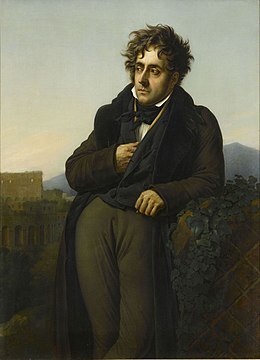
{Chateaubriand, by Girodet}
The only thing Larrey can neither forget nor forgive is betrayal.
During a reception given by the Comte de Rambuteau, Prefect of the Seine, Larrey sees a young officer whom he had known well in the wars of the Empire.
Endowed with a beautiful bass voice, he finishes his recital, leans nonchalantly on the piano before saluting a delighted audience. No one knows that with four other staff officers, he followed de Bourmont to pass to the enemy the day before Waterloo, white cockade on his hat, but in the early morning so as not to be seen.
Having distinguished Larrey among the guests, he crosses the room, walks towards him, a bewitching smile on his lips, hand widely extended:
"What! You don't recognize me, Mr. Larrey? I am ..."
Larrey, scowling, frowning, has taken two steps back, arms crossed, and interrupts him in an icy tone:
"The officer I knew by that name died at Waterloo!"
Then he ostensibly turns his back and leaves.
Jean Marchioni - Place à monsieur Larrey, chirurgien de la garde impériale
#xix#jean marchioni#place à monsieur larrey#dominique jean larrey#hippolyte larrey#alexandre dumas#baron taylor#françois rené de chateaubriand#franz liszt#and many others#romanticism is here#larrey doesn't like traitors
53 notes
·
View notes
Photo

Holy Family on the Flight into Egypt, Dominique Vivant Denon, 1809, Cleveland Museum of Art: Prints
Lithography was discovered in 1798 in Germany by Alois Senefelder (1771-1834), whose efforts to find an inexpensive method to reproduce the text of his plays accidentally led to a new and revolutionary way of printing. Although lithographs were almost immediately produced in Germany and England, the artists of France were the first to appreciate the aesthetic potentialities of this most flexible, responsive, and personal medium. In 1806, one of Napoleon's generals, Baron Lejeune, an amateur painter, was impressed by the technique while in Munich. Upon his return to Paris, he succeeded in introducing a few artists to the method, and by 1811 Denon's studio had become a fashionable center of lithography for amateurs.
Size: Sheet: 23.7 x 19.2 cm (9 5/16 x 7 9/16 in.); Image: 9.7 x 14.1 cm (3 13/16 x 5 9/16 in.)
Medium: lithograph
https://clevelandart.org/art/1940.1097
3 notes
·
View notes
Photo
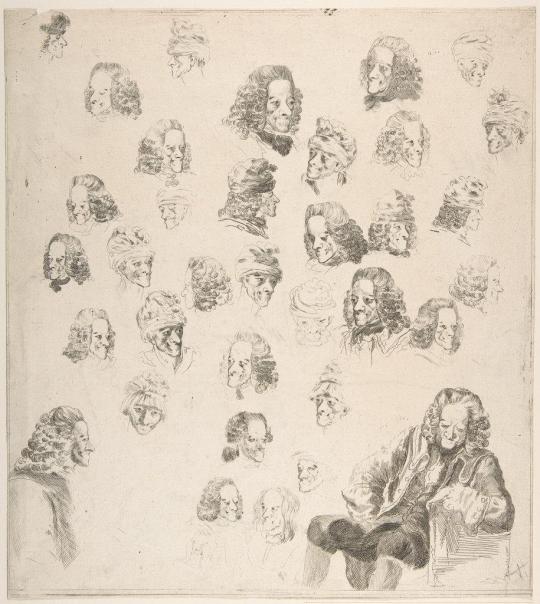
Sketches of Voltaire aged 81, by Baron Dominique Vivant Denon, just 2 yrs before the great Enlightenment thinker would pass away, #onthisday in 1778. Learn about his relationship to Buddhism in Donald S. Lopez, Jr.'s essay "Voltaire and the Buddha" — https://publicdomainreview.org/essay/voltaire-and-the-buddha
34 notes
·
View notes
Text
Shortly before Napoleon decided to invade Egypt in 1798, he met Baron Dominique Vivant-Denon at a party. Denon was a charmer, a favorite of Madame de Pompadour. He had held diplomatic posts in Russia at the Court of Catherine the Great, in Switzerland, and at Naples. Napoleon and Denon became close friends, and Denon, though in his fifties, went on the Egyptian campaign. His scholarship helped Napoleon choose superb museum objects, including the Rosetta stone that was afterward captured on its way to France by Lord Nelson and sent to the British Museum. Denon also aroused general admiration by his reckless coolness under fire. In 1800 Napoleon visited the Louvre for the first time and soon insisted that Denon be placed in charge of the museums of France and of all artistic services. In 1803 the Louvre became the Musee Napoleon, a name it retained until the emperor's downfall.
Napoleon and Denon, between them, devised a comprehensive museum system for France and her conquered satellites. Denon always sought the greatest masterpieces for the Louvre, but Napoleon made the final decisions, based on political expediency. As early as 1800, he had agreed to place paintings in the provincial cities of France that then included Brussels, Mainz, and Geneva. Eventually twenty-two cities benefited from the distribution of 1,508 paintings. Several museums were planned for Italian cities, though only the Brera Gallery in Milan, opened in 1809, was successfully organized; it received confiscations from throughout northern Italy.
Sometimes, reaction against French looting led to the establishment of museums. Thus, Louis Napoleon, king of Holland, founded the Koninklijk Museum (forerunner of the present Rijksmuseum) at Amsterdam in 1808. In Madrid, Joseph Bonaparte, king of Spain, worked with the artist Goya to keep the finest Spanish paintings from the clutches of Napoleon and Denon; later, in 1819, the collection was installed in the Prado and opened to the public. In 1813 Wellington captured paintings from the royal collection taken by Joseph on his flight from Spain. The duke offered to return them, but the Spanish government gave the 165 paintings to him. Today they repose in London as the Wellington Museum at Apsley House.
But those who live by the sword and the requisition shall perish by the sword and the requisition. When Napoleon was finally defeated at Waterloo in 1815, the paintings and art objects he had seized began to flow back to their previous owners. Not all of them returned; Denon's conveniently poor memory of their location saved a few for the Louvre, and most of those taken from churches and monasteries remained in France. But in all, the French museums gave up 2,065 pictures and 130 sculptures, including, of course, the Bronze Horses, Apollo Belvedere, and Laocoon. With tears of frustration in their eyes, the French people saw many treasures leave the acknowledged art capital of the world. Never again would so many masterpieces of painting and sculpture be on view in a single institution. Napoleon indeed had made great art and the museum symbols of national glory.
— Edward P. Alexander and Mary Alexander, Museums in Motion: An Introduction to the History and Functions of Museums
60 notes
·
View notes
Photo

Armand-Philippe-Joseph Bera, Portrait of Dominique Vivant, Baron de Denon in Egypt, 1804
24 notes
·
View notes
Text
1825 May, Sat. 14
6
11
Went out to the workmen at 7 40/60 – Staid with them till they had their drinking, and did not get home to breakfast till 12 – At 1 ¼ went back again to the workmen – Sauntered about while they got their dinner – Returned to them at 3 1/4 (they dined at 2 10/60) and staid with them till they gave up at 6 1/4 –
Sauntered very slowly home and came in at 6 40/60 – Washed my hands and sat down to dinner at 6 50/60 – James Smith and young William Jackman busy setting stakes and rails, and binding them with wood-binders (green stuff) at intervals of about or less than 3 yards down the line of new path, down Lower Brea Wood, to prevent the new cast earth from forcing down the wall at the bottom, so that, now before the place is filled up it looks like so many small sheep-pens –
Very fine day – Barometer 3 3/4 [degrees] above changeable, Fahrenheit 50 1/2 at 9 50/60 p.m., at which hour came up to bed – In the evening wrote the above of today –
On going upstairs before breakfast, found on my desk a letter 2 1/2 pages from Mademoiselle de Sans (Fossés des Carmes No. 11, Bordeaux). Her health not so good as in Paris – Anxiety and the heat of the climate disagree with her – Her aunt said if the family affairs of Mr. Droz “were arranged so as not to be” dans la gêne “qu'elle ne mettrait aucune opposition a ce qui pourrait faire mon bonheur” – She mentions the deaths of Monsieur le Baron Denon, and of Monsieur Lucas of the Jardin des Plantes – Begs me to write soon – E [two dots, treating venereal complaint] O [one dot, marking discharge] –
[in margin] Hotspur turned out this morning – Into the Hall Croft with the cows – but came home and slept in his shed –
[loose translation]
“dans la gêne “qu'elle ne mettrait aucune opposition a ce qui pourrait faire mon bonheur”
“in the embarrassment ‘that she would put no opposition to what could make me happy’”
4 notes
·
View notes




